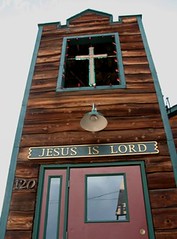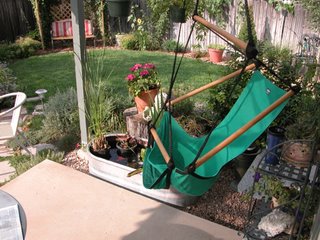Jimtown and other spontaneous things
Turned out to be a really nice day (though it started off with a medical appointment.) Was able to meet my friend at a coffee shop, and in talking we realized we would have to get back together again soon. It will take more time to finish catching up with each other and to begin to go further in discussing all those important issues we didn't have time for. O, the frustration of having your friends scattered hither and yon. You only get spurts of community. I drove around Lafayette and ended up going to a new cafe which had working wireless (the first one was having a problem with it.)
 Later Tom and I met up in Boulder and made a spontaneous decision to drive up into the mountains. I was coffeed out, so he got a cup to go and we headed north to Left Hand Canyon Rd. It is sooo nice to see the dark green of the pines and the lighter green of new leaves on some of the other trees. The bushy little scrub oaks had white blossoms. I love seeing the rushing water to the side of the curving road all the way up to Jamestown. The locals call it Jimtown. I wonder if/how we could do community way up here. We turned off the main road and wandered through the Bar-K-Ranch area, picking out lots with a scenic view to build our cabin on (one day.)
Later Tom and I met up in Boulder and made a spontaneous decision to drive up into the mountains. I was coffeed out, so he got a cup to go and we headed north to Left Hand Canyon Rd. It is sooo nice to see the dark green of the pines and the lighter green of new leaves on some of the other trees. The bushy little scrub oaks had white blossoms. I love seeing the rushing water to the side of the curving road all the way up to Jamestown. The locals call it Jimtown. I wonder if/how we could do community way up here. We turned off the main road and wandered through the Bar-K-Ranch area, picking out lots with a scenic view to build our cabin on (one day.) We stopped to take a few photos of the lake and had a conversation with some friendly folks who were out walking their dog. We consider staying for the Thursday night spaghetti dinner at the Mercantile building, next door to the chapel, but maybe another time. Can't believe I haven't been up to the mountains since fall. On the way back down the sunlight is changing--golden on the trees, but causing the lower half of the view to be shadowed. We talk about living up "the hill", but when we get back down to Boulder we are tired from the long, winding drive, and we know it would be a pain to do that daily. Wintertime would be really rough. But today, it was a gift to be able to do it. And when the Aspens leaf out, it will be even nicer to go back up.
We stopped to take a few photos of the lake and had a conversation with some friendly folks who were out walking their dog. We consider staying for the Thursday night spaghetti dinner at the Mercantile building, next door to the chapel, but maybe another time. Can't believe I haven't been up to the mountains since fall. On the way back down the sunlight is changing--golden on the trees, but causing the lower half of the view to be shadowed. We talk about living up "the hill", but when we get back down to Boulder we are tired from the long, winding drive, and we know it would be a pain to do that daily. Wintertime would be really rough. But today, it was a gift to be able to do it. And when the Aspens leaf out, it will be even nicer to go back up.



 Later Tom and I met up in Boulder and made a spontaneous decision to drive up into the mountains. I was coffeed out, so he got a cup to go and we headed north to Left Hand Canyon Rd. It is sooo nice to see the dark green of the pines and the lighter green of new leaves on some of the other trees. The bushy little scrub oaks had white blossoms. I love seeing the rushing water to the side of the curving road all the way up to Jamestown. The locals call it Jimtown. I wonder if/how we could do community way up here. We turned off the main road and wandered through the Bar-K-Ranch area, picking out lots with a scenic view to build our cabin on (one day.)
Later Tom and I met up in Boulder and made a spontaneous decision to drive up into the mountains. I was coffeed out, so he got a cup to go and we headed north to Left Hand Canyon Rd. It is sooo nice to see the dark green of the pines and the lighter green of new leaves on some of the other trees. The bushy little scrub oaks had white blossoms. I love seeing the rushing water to the side of the curving road all the way up to Jamestown. The locals call it Jimtown. I wonder if/how we could do community way up here. We turned off the main road and wandered through the Bar-K-Ranch area, picking out lots with a scenic view to build our cabin on (one day.) We stopped to take a few photos of the lake and had a conversation with some friendly folks who were out walking their dog. We consider staying for the Thursday night spaghetti dinner at the Mercantile building, next door to the chapel, but maybe another time. Can't believe I haven't been up to the mountains since fall. On the way back down the sunlight is changing--golden on the trees, but causing the lower half of the view to be shadowed. We talk about living up "the hill", but when we get back down to Boulder we are tired from the long, winding drive, and we know it would be a pain to do that daily. Wintertime would be really rough. But today, it was a gift to be able to do it. And when the Aspens leaf out, it will be even nicer to go back up.
We stopped to take a few photos of the lake and had a conversation with some friendly folks who were out walking their dog. We consider staying for the Thursday night spaghetti dinner at the Mercantile building, next door to the chapel, but maybe another time. Can't believe I haven't been up to the mountains since fall. On the way back down the sunlight is changing--golden on the trees, but causing the lower half of the view to be shadowed. We talk about living up "the hill", but when we get back down to Boulder we are tired from the long, winding drive, and we know it would be a pain to do that daily. Wintertime would be really rough. But today, it was a gift to be able to do it. And when the Aspens leaf out, it will be even nicer to go back up.


 Glenn T. Stanton, a self-professed member of the Religious Right, has some very good things to say about all of human experience being meaningful. He looks well beyond being pro-life in the anti-abortion sense to being pro-human and loving our neighbor and our enemy. He asks:
Glenn T. Stanton, a self-professed member of the Religious Right, has some very good things to say about all of human experience being meaningful. He looks well beyond being pro-life in the anti-abortion sense to being pro-human and loving our neighbor and our enemy. He asks: It's worth reading the
It's worth reading the 


























